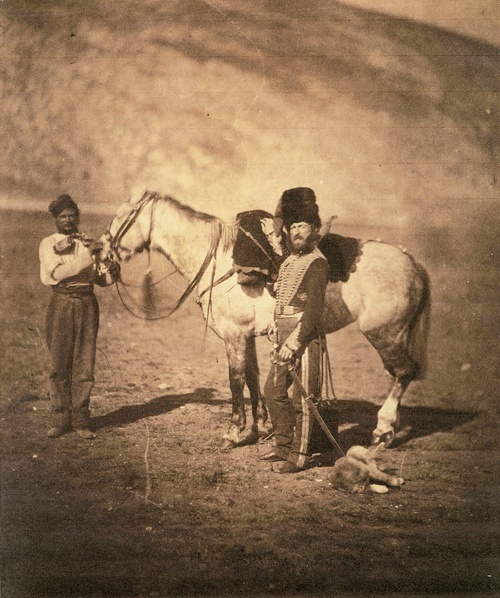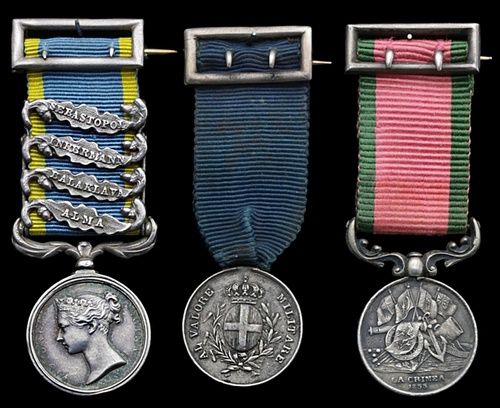Auction: 20001 - Orders, Decorations and Medals - conducted behind closed doors
Lot: 1163
'A greater humbug never before held the rank of Adjutant in the British Army.'
Troop Sergeant Major Smith's low opinion of Yates
The important group of three miniature dress medals awarded to Captain J. 'Joey' Yates, Adjutant of the 11th Hussars at the time of the Charge of the Light Brigade; a divisive and unpopular figure, Yates held back when his regiment advanced into North Valley, and did not take part in the Charge
Crimea 1854-56, 4 clasps, Alma, Inkermann, Balaklava, Sebastopol, the rim engraved in serif capitals 'John Yates. Lieutt. & Adjt. 11th Hussars'; Turkish Crimea 1855, Sardinian issue, manufactured by Hunt & Roskell, unnamed as issued; Sardinia, Kingdom, Al Valore Militare, the reverse centre engraved in running script 'Lt. & Adjt. J. Yates. 11th Huss.', all mounted with Hunt & Roskell silver top riband buckles, nearly extremely fine (3)
John Yates was born in 1819. He enlisted into the 17th Lancers in 1837, rising to become the regiment's Quartermaster-Sergeant on 6 July 1852. He was serving in this rank when the Light Brigade landed at Kalamita Bay in mid-September 1854, taking part in the cavalry skirmish on the Bulganek on the 19th. Three days later he suddenly transferred to the 11th Hussars, receiving a commission as a Cornet and being appointed Regimental Adjutant (then considered a ranker officer's task). This appointment caused deep resentment among the men of the 11th Hussars, as Troop Sergeant Major Loy Smith later recalled:
'Unfortunately for us (the 11th) Colonel Douglas allowed Colonel Lawrenson of the 17th Lancers to persuade him that his quartermaster [- sergeant] would make us an excellent adjutant - although at the time our two senior sergeant-majors were both eligible… I have heard on good authority that Colonel Douglas deeply regretted this act. If he did not I know the whole regiment did, for a worse rider, a worse drill, a greater humbug never before held the rank of Adjutant in the British Army. The 17th might well be glad to get rid of him; they certainly got the laugh of us.'
A terrible trick had been played on the 11th Hussars and they never forgave the 17th for landing them with a useless, timid Adjutant when there were plenty of worthy candidates for the role in their own regiment. On 25 October, when the Light Brigade began its fateful advance into North Valley, Yates was conspicuous by his absence. As Adjutant, he would have been expected to go into action, riding at the extreme right of the regiment. He appears to have skulked to the rear, rather than join the Charge. Troop Sergeant Major Smith recorded: 'Cornet Yates remained behind when the brigade was ordered to attack.' Private Pennington of the 11th wrote that 'Yates was temporarily indisposed' at the time of the attack, and 'returned to camp' (Brighton 2006, 290). One must surmise that the Adjutant, on seeing the Valley of Death, was overtaken by his desire for self-preservation. Assistant Surgeon Henry Wilkin volunteered to take Yates' assigned place in the line of battle, and went on to be recommended for the V.C. at Lucknow. Yates was promoted to Lieutenant on 20 December 1855, and Captain on 18 November 1859, when he was placed on half pay. A week later he was appointed Adjutant of the Cavalry Depot at Canterbury. He married Frances Margaret Yates, the only daughter of George Yates, of Edgbaston, on 10 February 1860. He died on 15 August 1862; sold with copied research.
Reference works:
Adkin, M., The Charge: The Real Reason why the Light Brigade was Lost (Barnsley, 1996).
Brighton, T., Hell Riders: The Truth about the Charge of the Light Brigade (London, 2004).
Subject to 20% VAT on Buyer’s Premium. For more information please view Terms and Conditions for Buyers.
Sold for
£900
Starting price
£700







